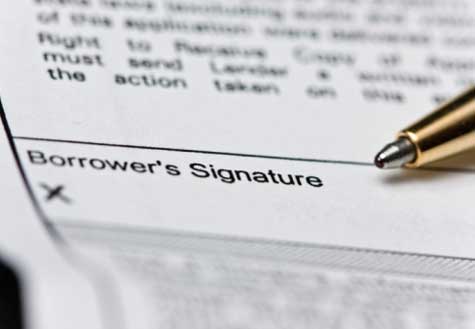|
Notaries working as loan signing agents really do get unfair press sometimes. This displeasure, generally from the lender side, is often undeserved and typically stems from clients not fully understanding the actual limitations of the Notary’s role in a signing. Client frustration with a Notary generally stems from expecting the notary to do things that are actually outside of the Notary’s prescribed function. It is very important that clients understand what a Notary is and is not able to do at a signing.
When the lender’s loan documents are completed and available, the escrow officer will arrange for a Notary to sign with the borrowers this is often a Mobile Notary who will drive out to meet the borrowers at their home or a mutually convenient location. The escrow / signing company will entrust the documents to the Notary and the Notary will be responsible to get the documents signed by the borrowers, notarize the documents that require Notarization, and return the documents to escrow. Once the escrow officer has received the documents she will review each document to ensure they were signed and completed. Then she will coordinate returning the documents to the lender for funding. A Notary Public is a neutral party to the transaction. His job at a loan document signing is to witness the borrower’s signature and notarize the documents that require Notarization such as, Deed of Trust, Grand Deed, Affidavits, Power of Attorney and miscellaneous lender documents. Prior to the signing the Notary should explain to the borrowers which documents the Notary is there to acknowledge and what she is there to do. The Notary is generally also is expected to ensure that the borrowers sign and date the documents appropriately. It is important for clients to understand that the Notary is not the lender’s substitute or surrogate and cannot give any legal advice or interpret the loan documents for the borrowers. A Notary may identify documents and point out the terms of the loan transactions but should not be expected to answer questions specific to the terms and conditions of the loan. It is also not the job of the notary to clarify any information regarding the transaction regarding who is paying what, why or when etc . The lender or loan officer is the one who can answer questions about the loan. However, the Loan Officer or Mortgage Representative may or may not be present at the loan document signing. Often the LO will review pertinent information of the loan with the client prior to the signing. Borrowers should be sure to get a contact phone number for the loan officer prior to signing. So they may reach them at the closing table to address any questions or concerns they may have. In order for the borrowers to feel at ease during a signing it’s often a good idea for them to read through all their documents prior to the signing appointment. They can ask for a copy of the documents in advance and review them for accuracy, errors, surprises, or documents they have difficulty understanding. Also, borrowers for owner-occupied refinances should know that they have a three day right to cancel the loan. If there are any documents or terms that they are concerned about, they can sign the loan document package and seek to have those items further clarified after the signing. If they still have concerns, they will have three days to cancel the loan before it funds Understanding the details of the notary’s role is important for all parties involved. This can help to avoid confusion during a transaction and protect notaries from incorrect assumptions about what it is or is not their job to do.
5 Comments
10/21/2020 09:00:25 pm
Thank you for sharing that a notary is needed to present on a loan document signing as a witness. It is very important to know the documents that need to have notarization in order to ensure that they will get through. I would like to think if someone needs to process a loan, he should hire a reliable notary service who can help become a witness.
Reply
1/20/2021 09:58:29 pm
I appreciated it when you shared that the Notary acts as the person who will get the documents signed by the borrowers. My sister just mentioned the other day that she is buying a house soon and the process is about to get done so she can finally acquire the property. I will suggest to her hiring a reliable Notary service that can help with the process of signing documents.
Reply
6/8/2021 08:11:00 pm
This is an excellent idea. I'm starting my own notary business and plan to incorporate this into my plan : In order for the borrowers to feel at ease during a signing it’s often a good idea for them to read through all their documents prior to the signing appointment. They can ask for a copy of the documents in advance and review them for accuracy, errors, surprises, or documents they have difficulty understanding.
Reply
5/24/2022 10:02:02 am
It's great that you explained how notary public services are in charge of signing off loan documents. I have a cousin that wants to apply for a loan next month but would like to know more about the process, so I think your article could provide key insight to him. Thanks for the information on notaries and their notarizing responsibilities after a loan's approval.
Reply
1/10/2023 04:34:02 pm
Thanks for explaining how one of the responsibilities of a notary public in a loan signing is to make sure the documents are signed and dated correctly. My parents want to get a loan this month to help them pay for a new house. They'd like the process to go as smoothly as possible, so I'll make sure they hire a notary public.
Reply
Leave a Reply. |
Archives
May 2024
Categories |


 RSS Feed
RSS Feed